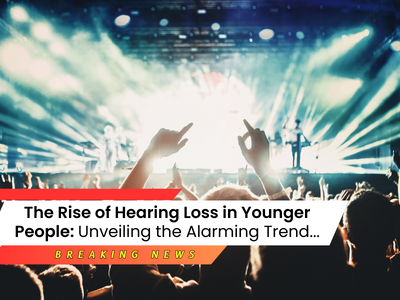Our Hearing Blog

The Rise of Hearing Loss in Younger People: Unveiling the Alarming Trend...
In recent years, a concerning trend has emerged—the rise of hearing loss among younger individuals. Traditionally associated with aging, hearing loss is now becoming a prevalent issue among the younger population. This blog unveils the unspoken factors contributing to this alarming rise and highlights the importance of raising awareness about hearing health to mitigate its impact on younger generation and their lives.
1.) Prolonged Exposure to Loud Noise: The proliferation of portable electronic devices and the growing popularity of recreational activities like concerts and clubs have exposed younger generations to unprecedented levels of noise. Prolonged exposure to loud music through earphones, concerts, or noisy work environments has become commonplace. These high noise levels, when sustained over time, can lead to noise-induced hearing loss (NIHL) among young individuals.
2.) Unsafe Listening Habits: Modern listening habits have contributed significantly to the rise of hearing loss in younger people. Many individuals engage in unsafe listening practices, such as listening to music at high volumes for extended periods or using earphones or headphones incorrectly. These habits put excessive stress on the delicate structures of the inner ear, causing irreversible damage to the auditory system.
3.) Lack of Awareness and Education: Many young people are unaware of the potential risks associated with prolonged exposure to loud noise. The importance of protecting one's hearing and adopting safe listening practices is often overlooked. Limited education and awareness about the long-term consequences of hearing loss have contributed to a lack of proactive measures to safeguard hearing health among the younger population.
4.) Shift in Recreational Activities: The rise in hearing loss among younger individuals can be attributed, in part, to shifts in recreational activities. The popularity of noisy environments, including concerts, music festivals, and sporting events, has grown. These activities often involve high decibel levels and inadequate noise control measures, leading to increased risks of hearing damage among participants.
5.) Impact of Personal Listening Devices: Personal listening devices, such as smartphones and MP3 players, have become ubiquitous in today's society. While they offer convenience and entertainment, improper use of these devices, such as listening at high volumes or for prolonged periods, can damage hearing health. The consistent use of earphones and headphones, often with ill-fitting or low-quality options, further exacerbates the risks.
6.) Bullet Proof Mentality: It won't happen to me my health is good, and I'll know when something is wrong. Hearing loss happens gradually, and many don't notice it, until it becomes an issue in everyday life, social gatherings and activities.
7.) Long-Term Consequences: The rise of hearing loss in younger people has far-reaching consequences. Hearing loss can impact various aspects of life, including social interactions, educational achievements, and career prospects. It may lead to communication difficulties, social isolation, decreased academic performance, and diminished quality of life. Early-onset hearing loss also increases the risk of developing other health issues like cognitive decline and mental health disorders.
The alarming trend and rise of hearing loss among younger people calls for immediate attention and action. Increased awareness and education are vital to promote safe listening habits, encourage the use of hearing protection in noisy environments, and advocate for responsible use of personal listening devices. Concert organizers, workplaces, and educational institutions should implement noise control measures to minimize exposure to excessive noise levels. By addressing these challenges and fostering a culture of hearing health, we can protect the hearing abilities of younger generations and ensure a better quality of life for all.
The good news is that 95% of hearing loss can be addressed with the right hearing aids...Start off with a FREE Hearing Test and Learn More!
Blog Archive

